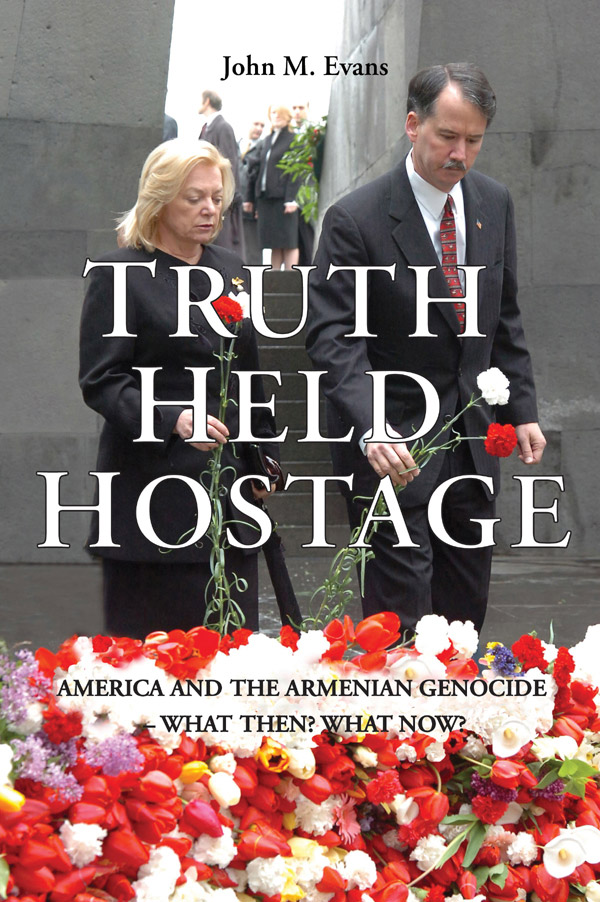
Truth Held Hostage: America and the Armenian Genocide - What Then? What Now?
with a foreword by Dr. Dickran Kouymjian
London: Gomidas Institute, 2016,
xxx + 170 pages, maps, photos, index,
ISBN 978-1-909382-26-8, hardback,
Price: UK£22.00 / US$32.00
To order please contact books@gomidas.org
"Ambassador John Evans’s Truth Held Hostage is the
most important work about the Armenian genocide by a US diplomat since
Henry Morgenthau’s groundbreaking Ambassador Morgenthau’s Story in 1918.
Evans writes with an elegant clarity that allows us to experience his
journey into a major personal and political ethical dilemma concerning
the truth of history and the untruth of US government protocol in the
name of foreign policy politics.
...This is a must read with implications for all histories of mass violence and trauma.”
—PETER BALAKIAN, author of The Burning Tigris: The Armenian Genocide and America’s Response
"Evans is a remarkable man who was an unusual American diplomat. A principled man steeped in history, he wrestled with the moral issue of whether to defy his own government’s increasingly awkward position on the Armenian Genocide. Evans’ tale of how he came to be involved in Armenia, his term as ambassador in Yerevan and his decision to break the US government’s genocide taboo is a compelling, page-turning read. It is fascinating not just for anyone interested in Armenian issues but as an inside story of international diplomacy and politics of recent times.”
—THOMAS DE WAAL, Senior Associate at Carnegie Europe and author of Black Garden: Armenia and Azerbaijan Through Peace and War
"This is a book from which one learns a great deal about the Armenian Genocide. It is also a poignant and uplifting book by and about an American ambassador, John Evans, who bravely placed ethical principles over the requirements of a diplomatic post.”
—ISRAEL W. CHARNY, Executive Director of the Institute on the Holocaust and Genocide in Jerusalem, a co-founder and past-president of the International Association of Genocide Scholars
"An informative, even-handed account of a matter of international importance."
—PAUL IGNATIUS, former Secretary of the Navy
...This is a must read with implications for all histories of mass violence and trauma.”
—PETER BALAKIAN, author of The Burning Tigris: The Armenian Genocide and America’s Response
"Evans is a remarkable man who was an unusual American diplomat. A principled man steeped in history, he wrestled with the moral issue of whether to defy his own government’s increasingly awkward position on the Armenian Genocide. Evans’ tale of how he came to be involved in Armenia, his term as ambassador in Yerevan and his decision to break the US government’s genocide taboo is a compelling, page-turning read. It is fascinating not just for anyone interested in Armenian issues but as an inside story of international diplomacy and politics of recent times.”
—THOMAS DE WAAL, Senior Associate at Carnegie Europe and author of Black Garden: Armenia and Azerbaijan Through Peace and War
"This is a book from which one learns a great deal about the Armenian Genocide. It is also a poignant and uplifting book by and about an American ambassador, John Evans, who bravely placed ethical principles over the requirements of a diplomatic post.”
—ISRAEL W. CHARNY, Executive Director of the Institute on the Holocaust and Genocide in Jerusalem, a co-founder and past-president of the International Association of Genocide Scholars
"An informative, even-handed account of a matter of international importance."
—PAUL IGNATIUS, former Secretary of the Navy
John Evans, formerly U.S. Ambassador to Armenia, gained notoriety in 2005 by publicly dissenting from the stated policy of the Bush and previous Administrations on the 90-year-old issue of the Armenian Genocide. A veteran of the U.S. Foreign Service, Ambassador Evans had no Armenian ancestors or family connections, but over the course of his historical studies and diplomatic career, became convinced that a gross injustice was being perpetrated against the Armenians through the denialist policies of the Turkish Government and the U.S. Government’s tacit acceptance of them. He decided to take a measured public stand, but then paid for his "heresy” by being dismissed from his post and forced into early retirement, although not without a fight over the issue in the U.S. Congress.
Over the course of his thirty-five-year career, Ambassador Evans served with distinction in diplomatic posts in Tehran, Prague, Moscow, Brussels (NATO), St. Petersburg and Washington, reaching the rank of Minister-Counselor. A native of Williamsburg, Virginia, educated at Yale and Columbia, he is an avid student of Russian history who devoted a sabbatical year to investigating the decline of the Ottoman Empire, the setting in which the tragic events of 1915 occurred.
Now retired from the Foreign Service, Mr. Evans makes his home in Washington with his wife, the former Donna Chamberlain.
Over the course of his thirty-five-year career, Ambassador Evans served with distinction in diplomatic posts in Tehran, Prague, Moscow, Brussels (NATO), St. Petersburg and Washington, reaching the rank of Minister-Counselor. A native of Williamsburg, Virginia, educated at Yale and Columbia, he is an avid student of Russian history who devoted a sabbatical year to investigating the decline of the Ottoman Empire, the setting in which the tragic events of 1915 occurred.
Now retired from the Foreign Service, Mr. Evans makes his home in Washington with his wife, the former Donna Chamberlain.